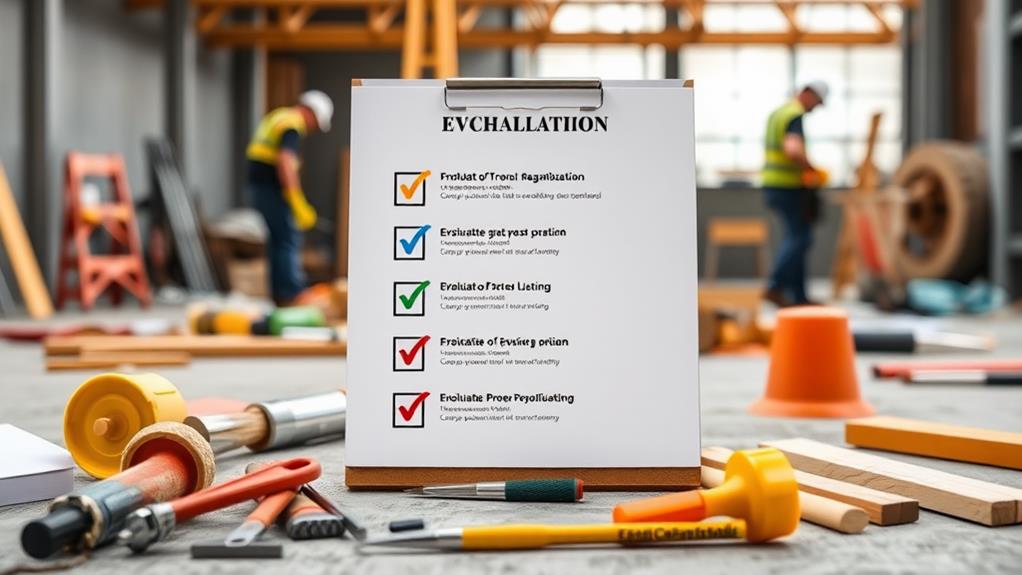Evaluating local contractors in seven steps is essential for guaranteeing your project's success. First, you define your project needs clearly, so everyone understands what's required. Next, you research local options and check their credentials. This helps guarantee they're licensed and insured. Reviewing past work gives you insights into their quality, while judging communication skills guarantees smooth interactions. Evaluating pricing and contracts protects your budget, and conducting interviews helps you find the right fit. By taking these steps, you minimize risks and build strong relationships. You'll uncover even more helpful tips to find the best contractor.
Importance of Evaluating Contractors

When you evaluate local contractors, you're setting your project up for success right from the start. Taking the time to assess their skills, resources, and knowledge tailored to your specific project needs is fundamental. This step guarantees that the contractor you choose can meet local building codes and regulations, reducing the risk of legal issues and project delays.
Additionally, confirming that contractors have proper licensing and insurance can further safeguard your project from potential liabilities.
Furthermore, regular evaluations can lead to improved project outcomes. Contractors who perform well are 40% more likely to finish projects on time and within budget. By prioritizing evaluations, you also promote transparent communication, which builds trust between you and your chosen contractor. Trust is essential for maintaining long-term business relationships.
Additionally, effectively evaluating local contractors helps you avoid the risks associated with poor workmanship. High-quality results not only satisfy clients but also pave the way for repeat business opportunities.
Step 1: Define Project Needs
Defining your project needs is essential for a successful contractor selection process. Start by clearly outlining the specific requirements of your construction projects. This includes identifying the type of construction or renovation needed so general contractors understand the project scope.
Consider the unique characteristics of your project site, such as size and location, and any environmental or zoning regulations that may impact construction.
Next, identify your key project goals. Think about budget constraints, timeline expectations, and desired quality standards. This will help you communicate effectively with potential contractors.
Additionally, determine necessary project features, including materials and technologies, to guarantee that contractors have the expertise and resources to meet your needs.
Don't forget to engage in discussions with stakeholders. Gathering insights and perspectives about project priorities will refine your defined project needs, making it easier when you seek contractor proposals.
Step 2: Research Local Options

To kick off your search for local contractors, start by compiling a list of potential candidates from various sources. You can use online directories, trade associations, or ask friends and industry professionals for referrals. This approach guarantees you have a diverse range of options to evaluate.
Next, utilize platforms like Yelp or Angie's List to read customer reviews and ratings. These insights can help you find contractors known for their reliable work and quality service.
Investigate each contractor's portfolio, focusing on previous projects that are similar in size and scope to yours. This way, you can gauge their experience and skill level.
Don't forget to verify each contractor's licenses, insurance, and bonding status through local regulatory agencies. This step guarantees they meet legal requirements and can handle any potential liabilities that may arise during your project.
Step 3: Check Credentials
Before making a final decision, it's crucial to check the credentials of any contractor you're considering. This step guarantees that the contractor meets the necessary requirements to work in the construction industry and protects you from potential issues down the line.
Here are three key areas to focus on:
- Licenses and Certifications: Verify that the contractor holds all necessary licenses and certifications required by local and state regulations. These credentials confirm compliance with legal standards and professional practices.
- Insurance Coverage: Check for insurance, including general liability and worker's compensation. This protects you against accidents or damages that may occur during the project.
- Bonding Status: Assess the contractor's bonding status. A surety bond provides financial security in case the contractor fails to complete the work.
Step 4: Review Past Work

Regularly reviewing a contractor's past work is essential for evaluating their quality and workmanship. By examining completed construction projects, you can gain valuable insights into how well the contractor meets project specifications and timelines.
Look for examples that are similar in scope and complexity to your intended project; this relevant experience can indicate the contractor's expertise.
Don't hesitate to request client references from those past projects. Hearing firsthand accounts of the contractor's reliability, communication, and problem-solving skills can provide a clearer picture of what it's like to work with them.
Additionally, evaluating before-and-after photos or case studies can showcase the contractor's aesthetic and functional outcomes.
This analysis highlights their design capability and attention to detail, which are vital for any successful project.
Step 5: Assess Communication Skills
Evaluating a contractor's past work provides a solid foundation for your evaluation, but their communication skills play a vital role in the overall success of your project.
Strong communication guarantees everyone is on the same page, which helps avoid misunderstandings and keeps your project on track.
To effectively evaluate a contractor's communication skills, consider the following:
- Responsiveness: Pay attention to how quickly they respond to your initial inquiries. This can give you insight into their commitment to client engagement.
- Proactive Updates: A good contractor will provide regular updates on project progress. This helps you stay informed and allows for adjustments if any issues arise.
- Active Listening: Evaluate their ability to listen and address your concerns promptly. This skill is essential for building trust and maintaining strong working relationships throughout the project lifecycle.
Establishing clear communication channels and protocols early on can enhance efficiency and minimize delays caused by miscommunication.
Step 6: Evaluate Pricing and Contracts

When it comes to evaluating local contractors, pricing and contracts are essential components that can greatly impact your project's success. Start by comparing quotes from multiple contractors to verify their pricing is competitive. Remember to take into account the scope of work and materials included in each quote, as this can vary considerably.
Next, review the contract details carefully. Make sure all necessary aspects of the construction project, such as timelines, payment schedules, and scope of work, are clearly defined.
Look for industry-standard practices in the contractor's pricing, including overhead costs and profit margins, which typically range from 15% to 45%.
It's also vital to confirm that the contracts comply with local building codes and regulations. This helps prevent potential legal issues and project delays.
Evaluate any contingencies included in the contract, which should address unexpected costs and changes. Understanding how these will be managed provides clarity and peace of mind.
Step 7: Conduct Interviews
When you conduct interviews with potential contractors, you get a chance to assess their communication skills, which is vital for a smooth construction process.
It's important to prepare targeted questions that focus on their past projects and how they tackle challenges, helping you gauge their experience and fit for your needs.
Prepare Targeted Questions
Conducting interviews with potential contractors is a crucial step in your selection process, and having a well-prepared list of targeted questions can make all the difference.
These questions should focus on essential areas that reveal their capabilities and commitment to quality. Here are three key topics to cover:
- Contractors' Past Project Experiences: Ask for specific examples of similar work they've completed successfully. This will help you understand their expertise and reliability.
- Project Management: Inquire about their approach to managing projects, including how they handle scheduling, budget adherence, and communication with clients and subcontractors. This insight will show you how organized and responsive they are.
- Quality Control: Explore their processes for quality control and safety measures implemented on previous projects. Understanding their commitment to maintaining high standards can help you assess the overall quality they'll bring to your project.
Additionally, don't forget to discuss local building codes and their availability for ongoing support post-construction.
Having these tailored questions will guide your interview and provide clarity on which contractor is the best fit for your needs.
Assess Communication Skills
How well a contractor communicates can greatly impact the success of your project. Effective communication skills are vital for contractors, as they guarantee a clear understanding of project requirements, timelines, and expectations. This reduces the risk of misunderstandings that could derail your plans.
During interviews, pay close attention to how a contractor articulates their ideas and responds to your questions. This can indicate their ability to manage project dynamics effectively.
Don't hesitate to ask about their preferred communication methods; this will help you gauge their flexibility and willingness to adapt to your style.
Also, evaluate their responsiveness during the interview process. Prompt replies can signal their commitment and reliability in communication throughout your project.
Building Long-Term Relationships

Building long-term relationships with local contractors is essential for the success of your projects.
When you establish trust and reliability, you create a foundation for ongoing communication, making it easier to address issues and keep everyone aligned.
Regular check-ins can help guarantee that goals are met and that any concerns are addressed promptly, leading to a smoother collaboration overall.
Trust and Reliability
Over time, establishing trust and reliability with local contractors can greatly enhance your project outcomes. When you evaluate contractors, you're not just looking at their skills; you're also building a foundation for long-term relationships.
Here are three key benefits of fostering trust and reliability:
- Proven Track Record: By checking client testimonials and references, you can confirm a contractor's reliability and performance. Knowing their history gives you peace of mind.
- Better Pricing and Resources: Long-term relationships often lead to better negotiation terms. When contractors know you well, they may offer priority access to resources and discounts, which can save you money.
- Smoother Communication: Engaging consistently with reliable contractors leads to better collaboration. Familiarity reduces misunderstandings, making project execution more efficient.
Ongoing Communication Strategies
Effective communication is the cornerstone of successful long-term relationships with local contractors. To build this foundation, establish a clear chain of command. By knowing whom to approach for specific concerns, everyone stays informed, which enhances ongoing communication.
Regularly scheduled safety update meetings also play an essential role. These meetings allow for ongoing training and discussion, promoting a culture of safety and awareness among contractors.
Implementing contractor management systems can further facilitate real-time progress tracking. This transparency helps maintain accountability through shared timelines and checklists. Encourage open-door hours for contractors to voice concerns. This supportive environment fosters trust and collaboration, making it easier to address issues as they arise.
Additionally, utilizing periodic feedback sessions allows both you and the contractors to assess communication effectiveness. These sessions provide an opportunity for constructive feedback, helping to clarify any misunderstandings and align on project expectations moving forward.
Finalizing Your Contractor Choice
Choosing the right contractor is a critical step in guaranteeing your project runs smoothly and meets your expectations. To finalize your contractor choice, focus on these essential steps:
- Verify Credentials: Check that the contractor has the necessary licenses, insurance, and bonding. This guarantees compliance with local regulations and protects you from potential liabilities.
- Review Experience: Look at the contractor's experience with similar projects. Their past work can give you insights into their ability to handle specific challenges that may arise during your project.
- Establish Clear Communication: Make sure to outline communication expectations and project timelines in your contract. This helps prevent misunderstandings and fosters a positive working relationship, which is crucial for successful final inspections.
Conclusion
To summarize, evaluating local contractors is like building a solid foundation for your project. By following these seven steps, you guarantee that you choose someone reliable and skilled. Don't rush the process; take your time to define your needs, check credentials, and conduct interviews. This careful approach not only helps you find the right contractor but also lays the groundwork for a successful partnership. With the right choice, your project can turn into a masterpiece!


Leave a Reply